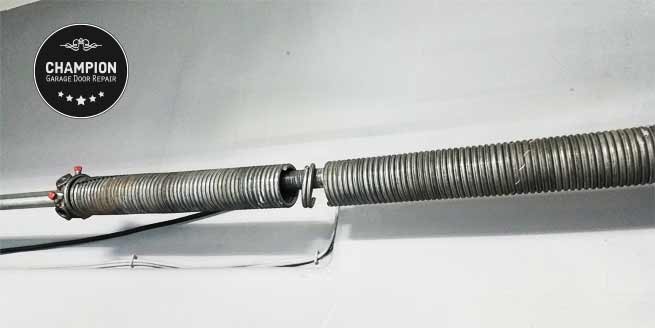There are various reasons why your garage door may fail to open, with some issues being more common than others. Let’s explore what can cause a garage door not to open and the most effective ways to fix it.
1. Broken Garage Door Spring
If your garage door spring is broken, you may find that the door only opens a few inches or refuses to open altogether. Garage door springs are designed to support the weight of the door, enabling both manual operation and use with an electric door opener.

When a garage door spring breaks, the door becomes exceptionally heavy and won’t open properly due to the lack of counterbalance. If your torsion spring is broken, you’ll notice a separation in the spring’s coil, with an approximate 2-inch gap.
2. Obstructions
Objects or debris caught in the doorway may prevent the garage door from opening. If the garage door isn’t regularly maintained, the mounting bolts of the tracks may loosen over time, obstructing the door’s path. Additionally, broken, worn, or misplaced rollers, hinges, and manual locks can also prevent the door from opening. Inspect the garage door path for any objects, loose bolts, or apparent breakage.
3. Shifting Foundation and Deformed Garage Frame
Shifting garage foundations may lead to the misalignment of the garage door’s frame, moldings, supporting brackets, and tracks, as well as misalignment of the torsion assembly. In some cases, this misalignment can cause a garage door to stick and not open. A deformed garage frame can also prevent the garage door from opening, as it binds against the jambs. The frame can deform due to shifting foundations and moisture, which causes the garage’s wood frame to swell.
4. Problems with the Door Opener
One common reason that can cause your garage door not to open is a mechanical or electrical issue with the automatic garage door opener. Such problems can prevent your garage door from opening. Issues with the opener include worn gears, a broken sprocket, no power due to a power outage or faulty motherboard, uncalibrated opener force, a worn motor, a faulty travel module and limits switch, or a broken belt or chain. Check for any error codes coming from your garage door opener and consult the owner’s manual.
5. The Remote’s Battery is Drained
To test if there’s a problem with the garage door opener remote, try using the opener’s hardwired wall console to open the door. If it does open, you may need to change the battery inside the remote. If the garage door won’t open using the remote control and wall console, the problem is likely with the garage door opener itself.
6. Frequency Interference
If your garage door will open using the hardwired wall button but won’t open with the remote controls even after replacing the batteries and reprogramming them, it may be a frequency interference issue. Problems with range, remote controls that only open the door when close, and remotes that work intermittently also indicate a frequency interference problem.
7. Balance Problems
Imbalance occurs when the garage door springs fail to generate the necessary force to support the weight of the door. This issue can lead to the door becoming excessively heavy, exceeding the opener’s capacity and preventing it from opening. Balancing the door can be done by adjusting the spring tension. In some cases, though, it may be necessary to replace the springs.
What to Do If Your Garage Door Won’t Open
If your garage door is malfunctioning, you can still try open it manually using the emergency release function. Ensure that the door is fully closed before disengaging it from its opener. Note that attempting to open a broken garage door can be dangerous, especially for heavier doors made of materials like wood, glass, or steel that can weigh hundreds of pounds.
Try to troubleshoot common garage door problems, or contact a licensed garage door repair company if you are unsure what’s causing the issue. Many companies offer emergency repair services and can address the issue on the same day.







